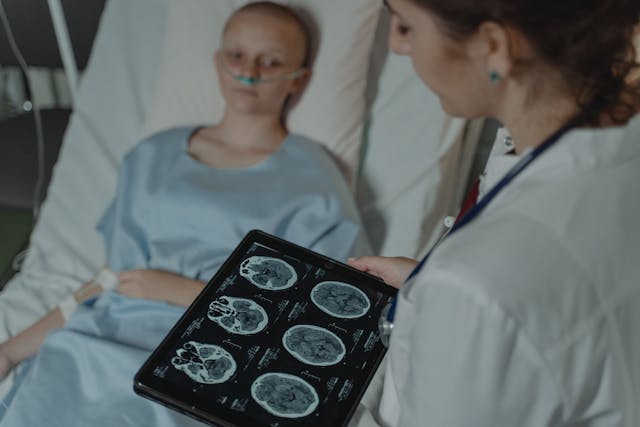
The sudden death of a teenager is always a tragedy, but when it’s due to a rare brain tumor, it becomes even more heartbreaking. In this story, a mother’s grief turns into a mission to raise awareness about the disease that took her daughter’s life. By sharing her experience, she hopes to help other parents recognize the signs of a brain tumor in their own children and potentially save lives.
A Heartbreaking Loss
Jody, a 12-year-old girl, experienced symptoms such as frequent tripping, difficulty walking straight, and trouble with fine motor skills like fastening buttons. Initially, these signs were not recognized as serious until she was diagnosed with a rare brain tumor. After battling the disease for years, Jody passed away at age 16 in 2022. Her mother, Sarah Levett from Surrey in South East England, now advocates for awareness about the condition to help parents identify potential signs of brain tumors early on.
The Rarity of the Brain Tumor
Brain tumors are relatively rare, with only about 2,500 children and adolescents in the United States being diagnosed with them each year. However, when they do occur, they can be incredibly dangerous and difficult to treat. The young girl in this story had a particularly rare and aggressive form of brain cancer, which made her prognosis even more challenging.
Recognizing the Signs
One of the most important aspects of raising awareness about brain tumors is educating parents and caregivers on the signs and symptoms to look for. While some symptoms may be more obvious, such as seizures or sudden changes in vision, others can be more subtle and easily overlooked. Here are some common signs of a brain tumor in children and teenagers:
1. Persistent headaches: While headaches are not uncommon in children and teenagers, persistent or worsening headaches could be a sign of a brain tumor.
2. Nausea and vomiting: Unexplained nausea and vomiting, especially in the morning, can be a sign of a brain tumor.
3. Changes in personality or behavior: A brain tumor can cause changes in a child’s personality or behavior, such as irritability, mood swings, or difficulty concentrating.
4. Balance and coordination problems: A brain tumor can affect a child’s balance and coordination, leading to clumsiness or difficulty walking.
5. Vision problems: A brain tumor can cause double vision, blurred vision, or loss of vision in one eye.
6. Hearing problems: A brain tumor can cause hearing loss or ringing in the ears.
7. Seizures: Seizures can be a sign of a brain tumor, but they can also be caused by other conditions. If a child experiences a seizure, it’s important to seek medical attention immediately.
8. Unexplained weight loss: Rapid weight loss without a known cause could be a sign of a brain tumor.
9. Fatigue: Unexplained fatigue or lethargy can be a sign of a brain tumor.
10. Difficulty speaking or understanding language: A brain tumor can affect a child’s ability to speak or understand language, leading to slurred speech or difficulty following conversations.
The Importance of Early Detection
Early detection is crucial when it comes to brain tumors in children and teenagers. The sooner a brain tumor is diagnosed, the sooner treatment can begin, and the better the chances of a successful outcome. However, brain tumors can be difficult to diagnose, especially in their early stages, which is why it’s so important for parents and caregivers to be aware of the signs and symptoms.
If you suspect that your child may have a brain tumor, it’s important to seek medical attention immediately. A doctor will be able to perform a thorough examination and order any necessary tests to determine if a brain tumor is present.
Conclusion
The story of the young girl who lost her battle with a rare brain tumor is a heartbreaking reminder of the importance of raising awareness about this devastating disease. By educating parents and caregivers on the signs and symptoms of brain tumors, we can help save lives and give children and teenagers a better chance at a healthy future. If you suspect that your child may have a brain tumor, don’t hesitate to seek medical attention. Early detection is crucial in the fight against this disease.

